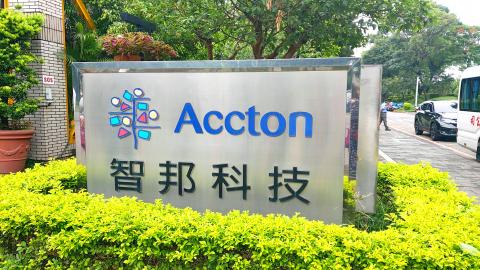Ethernet switch maker Accton Technology Corp (智邦科技) yesterday said that US trade sanctions on Huawei Technologies Co’s (華為) 5G network equipment would not slow down global 5G commercial launches, given limited adoption of Huawei equipment before the US-China trade dispute.
“Worldwide 5G deployment remains on track, as only one or two telecom operators were affected [by the US sanctions]. We do not expect any delays,” Accton president Lee Chih-chiang (李志強) told Unique Satellite TV on the sidelines of a company shareholders’ meeting yesterday.
Japanese telecom operators bought 5G networking equipment from established equipment suppliers, while only a handful of telecom operators in other regions opted for Huawei’s 5G equipment, the TV channel quoted Lee as saying.

Photo: Wang Yi-hung, Taipei Times
“We are cautiously monitoring how the US-China trade tensions play out, though,” Lee said.
To minimize the trade dispute’s potential effects, Accton is accelerating its capacity expansion in Taiwan, Lee said.
The company plans to ramp up five new production lines in Miaoli County’s Jhunan Township (竹南) in the third quarter, he said.
“We plan to hire 700 more people this year,” Lee added.
Together with the three existing production lines at its Hsinchu plant, Accton expects capacity from its local operations to make up half of its total capacity, with Chinese plants making up the remainder, Unique Satellite TV reported.
Taiwan is expected to outpace China as Accton’s biggest manufacturing base next year by contributing 60 percent capacity, Lee said.
Less than 5 percent of Accton’s shipments to the US are currently made in China, as the company started to shift production out of China last year, Lee said.
Accton told the shareholders’ meeting that it plans to spend NT$800 million (US$25.39 million) on new facilities and equipment this year, Chinese-language online news outlet Wealth reported.
At the annual general meeting, shareholders approved a proposed cash dividend of NT$4 per common share, representing a payout ratio of 75 percent based on the company’s earnings per share of NT$5.33 last year.
Accton made NT$2.95 billion in net profit last year, up 15 percent from NT$2.56 billion in 2017, the company’s annual report showed.

Taiwan would remain in the same international network for carrying out cross-border payments and would not be marginalized on the world stage, despite jostling among international powers, central bank Governor Yang Chin-long (楊金龍) said yesterday. Yang made the remarks during a speech at an annual event organized by Financial Information Service Co (財金資訊), which oversees Taiwan’s banking, payment and settlement systems. “The US dollar will remain the world’s major cross-border payment tool, given its high liquidity, legality and safe-haven status,” Yang said. Russia is pushing for a new cross-border payment system and highlighted the issue during a BRICS summit in October. The existing system

Convenience store operator Lawson Inc has registered trademarks in Taiwan, sparking rumors that the Japanese chain is to enter the local market. The company on Aug. 30 filed trademarks for the names Lawson and Lawson Station, according to publicly available information from the Ministry of Economic Affairs’ Intellectual Property Office. The product categories on the application include some of Lawson’s top-selling items for use in the convenience store market. The discovery has led to speculation online that the popular Japanese chain is to enter the Taiwanese market. However, some pointed out that it might be a preemptive application to avoid others from co-opting the

Taiwan Semiconductor Manufacturing Co (TSMC, 台積電) is expected to grow its revenue by about 25 percent to a new record high next year, driven by robust demand for advanced technologies used in artificial intelligence (AI) applications and crypto mining, International Data Corp (IDC) said yesterday. That would see TSMC secure a 67 percent share of the world’s foundry market next year, from 64 percent this year, IDC senior semiconductor research manager Galen Zeng (曾冠瑋) predicted. In the broader foundry definition, TSMC would see its market share rise to 36 percent next year from 33 percent this year, he said. To address concerns

Intel Corp chief financial officer Dave Zinsner said that a formal separation of the company’s factory and product development divisions is an open question that would be decided by the chipmaker’s next leader. Zinsner, who is serving as interim co-CEO following this month’s ouster of Pat Gelsinger, made the remarks on Thursday at the Barclays technology conference in San Francisco alongside co-CEO Michelle Johnston Holthaus. Intel’s struggles to keep pace with rivals — along with its deteriorating financial condition — have spurred speculation that the next CEO would make dramatic changes. That has included talk of a split of the company’s manufacturing